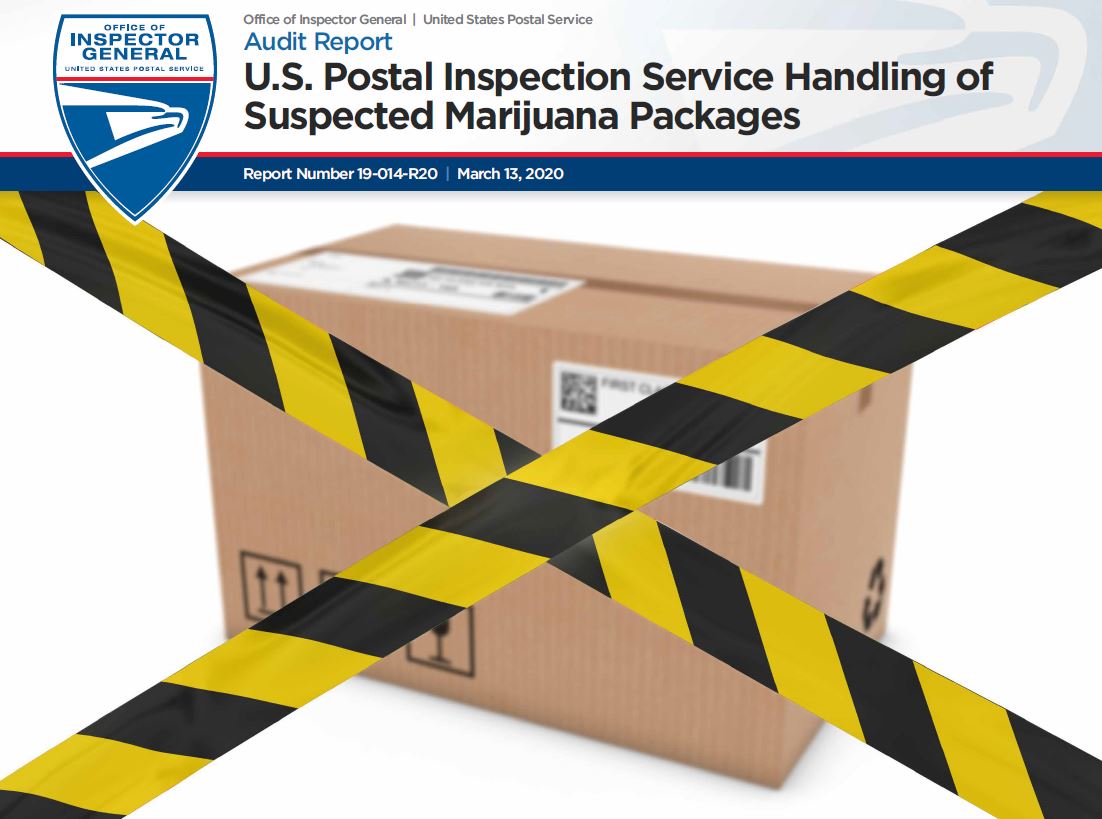Objective
Our objective was to determine whether the U.S. Postal Inspection Service has efficient and effective controls to manage the Administrative Non-Mailability Protocol (ANP) program.
Postal inspectors are federal law enforcement officers responsible for enforcing laws that defend the nation’s mail system from illegal or dangerous use. In 2016, the Postal Inspection Service implemented the ANP program, which is an administrative procedure used to detain, document, and process mail packages that are reasonably suspected of containing marijuana from the mailstream.
Unlike in criminal investigations, the ANP program does not require postal inspectors to obtain search warrants to open detained packages. Rather, they request consent from mailers or addressees to open detained packages. If there is no response after 21 days, packages are declared abandoned and can be opened. When identified as non-mailable items, their contents are seized and disposed and mailable items are returned to the original addressees. Due to this process, the Postal Inspection Service has determined that abandoned packages are not used as evidence in criminal investigations; however, information about the packages, such as an address, may be used to support new or ongoing criminal investigations. This program was established primarily to remove marijuana from the mailstream.
The Postal Inspection Service had [redacted] ANP sites to process suspected packages from the western U.S. During July 2018, the Postal Inspection Service established the [redacted] to serve as a central processing location for the mailing of suspected marijuana packages from areas without an ANP site. In fiscal year (FY) 2019, the Postal Inspection Service processed 54,877 packages suspected of containing marijuana at both the [redacted] and ANP sites.
Findings
Opportunities exist for the Postal Inspection Service to enhance management of the ANP program. Specifically, in FY 2019 we found:
- The ANP program was established to remove marijuana from the mailstream; however, other types of illicit drugs have been found during the abandoned process. Specifically, 1,839 of 95,491 pounds (2 percent) of narcotics seized were identified as illicit drugs other than marijuana. Since the ANP program restricts postal inspectors from using the contents of abandoned illicit drugs as evidence, it may limit opportunities for criminal prosecutions.
- 219 of 15,941 packages sent to the [redacted] were lost. Based on available tracking data for 191 of them, postal inspectors did not use [redacted] suggested mailing methods for 188 packages. This occurred because [redacted] policy recommends, but does not require, postal inspectors to use a more controlled mailing method. In addition, packages containing marijuana emit a strong odor and can be easily detected [redacted]. [Redacted] display [redacted]” on the mailing label address, both of which increase the risk of theft by postal employees processing this mail. When packages suspected of containing illicit drugs are lost or stolen, there is an increased risk that those drugs could be illegally distributed or used. In addition, when suspect packages which contain legitimate mailable items are sent to the [redacted] and are lost, this could impact the Postal Service’s brand reputation.
- Personnel at the [redacted] allowed Postal Service employees to drop off Registered Mail suspected of containing illicit drugs in an accessible container identified for [redacted] use. This container is near the workroom floor of the mail delivery unit and is accessible to all Postal Service and Inspection Service employees. Although there are security cameras by the container to deter and detect theft, they do not [redacted]. Postal Service Registered Mail policy requires hand-to-hand exchange of Registered Mail. When [redacted] personnel are not adhering to Registered Mail requirements, it could contribute to the loss or theft of packages suspected of containing illicit drugs.
- Eighteen of 30 (60 percent) postal inspectors we interviewed did not properly document ANP program activities to support workhours. This occurred because the ANP policy is not aligned with the Inspection Service Manual, which requires documentation of daily activities to support workhours. Complete and accurate recording and documenting of workhour information is needed for management to assess the productivity of individual inspectors and the ANP program. As a result, 2,228 workhours were unsupported in FY 2019. The Postal Inspection Service spent about $253,613 annually on unsupported workhours.
- Inspection Service personnel did not always ensure proper documentation of evidence bags at the [redacted] and [redacted] ANP locations we visited. Specifically, of 265 evidence bags we reviewed, the weight of the drugs in five bags did not match the weights in the tracking system. Weight discrepancies ranged from less than one pound to about two pounds and the average weight discrepancy was .92 pounds. In addition, three evidence bags were missing both the responsible party and a witness’ initials and dates across the evidence bag sealing tape. This occurred due to a lack of postal inspector oversight. When Inspection Service personnel do not handle evidence in accordance with policy, there is potential risk of loss and theft of illicit drugs.
Recommendations
We recommended management:
- Coordinate with relevant executive agencies, such as the Department of Justice to determine whether the contents of abandoned packages, other than marijuana, can be used as evidence in criminal investigations and update the ANP program policy as needed.
- Update ANP program policy to require the use of a more controlled mailing method and communicate the requirement to all divisions.
- Use scent-proof packaging to conceal the smell of marijuana and remove [redacted] from the mailing label for packages destined to the [redacted].
- Reinforce the Registered Mail hand delivery requirement at the [redacted].
- Align the ANP program policy with the Inspection Service Manual that requires daily activity documentation to support workhours.
- Implement a periodic review process to ensure evidence bags contain proper dates and initials; and ensure drug weight is accurately recorded in the tracking system.
Read full report
Source: USPS Office of Inspector General

